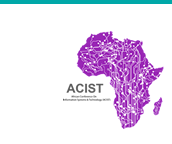Location
Malawi University of Science & Technology, Malawi
Start Date
25-8-2022 4:30 PM
End Date
25-8-2022 4:55 PM
Description
The improvement of health care, efficiency, safety, and quality of delivery and access for patients highly portray a rather significant increase in public healthcare. The emergence of this proliferation of healthcare technology is then expected to grow. Therefore, Information technology (IT) has become significant part of providing consistent care quality by healthcare professionals to patients. The study seeks to explain on factors that influence the implementation of Smart Card Technology in South African public healthcare institutions. This was a cross-sectional study conducted in four Tshwane hospitals in Gauteng province, South Africa in 2021. A quantitative research method approach was used. respondents were selected using the purposive sampling method. using a self-administered questionnaire completed by (n=406) healthcare professionals from Steve Biko academic hospital, Tshwane District hospital, Kalafong hospital and Pretoria West Hospital were analysed. The structural equation modeling (SEM) and principal component analysis (PCA) methods in statistical package for social sciences (SPSS) were used to analyse the data. The factor analysis in this study used 15 variables were used for the conceptual framework. The findings generally supported the hypothesized model. The study recommends that a framework for the implementation of SCT be developed in public healthcare.
Included in
A Structural Equation Model for implementation of Smart Card Technology in public healthcare
Malawi University of Science & Technology, Malawi
The improvement of health care, efficiency, safety, and quality of delivery and access for patients highly portray a rather significant increase in public healthcare. The emergence of this proliferation of healthcare technology is then expected to grow. Therefore, Information technology (IT) has become significant part of providing consistent care quality by healthcare professionals to patients. The study seeks to explain on factors that influence the implementation of Smart Card Technology in South African public healthcare institutions. This was a cross-sectional study conducted in four Tshwane hospitals in Gauteng province, South Africa in 2021. A quantitative research method approach was used. respondents were selected using the purposive sampling method. using a self-administered questionnaire completed by (n=406) healthcare professionals from Steve Biko academic hospital, Tshwane District hospital, Kalafong hospital and Pretoria West Hospital were analysed. The structural equation modeling (SEM) and principal component analysis (PCA) methods in statistical package for social sciences (SPSS) were used to analyse the data. The factor analysis in this study used 15 variables were used for the conceptual framework. The findings generally supported the hypothesized model. The study recommends that a framework for the implementation of SCT be developed in public healthcare.



